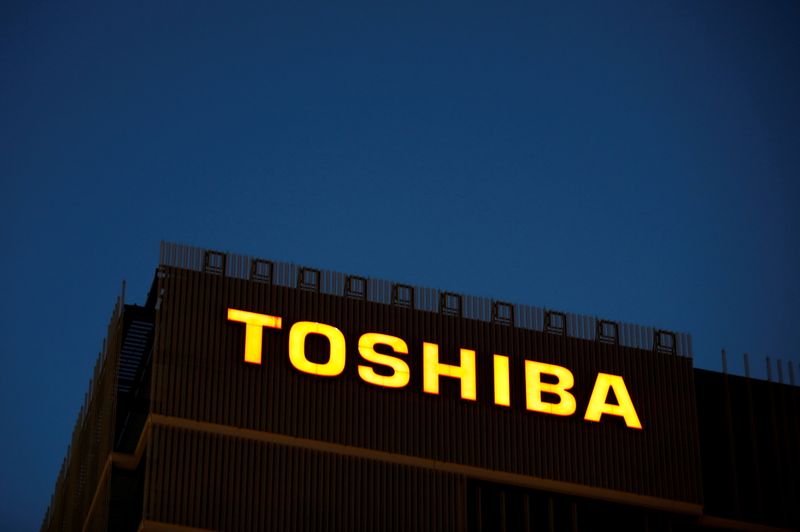By Makiko Yamazaki and Scott Murdoch
TOKYO (Reuters) - Toshiba (OTC:TOSYY) Corp outlined plans on Friday to split into three companies in an attempt to appease activist shareholders calling for a radical overhaul of the Japanese conglomerate after years of scandals.
A rare move in a country dominated by conglomerates, Toshiba's breakup comes the same week U.S. industrial powerhouse General Electric (NYSE:GE) called time on its sprawling empire and Johnson & Johnson (NYSE:JNJ) announced it was splitting up too.
Founded in 1875, Toshiba plans to house its energy and infrastructure divisions in one company while its hard disk drives and power semiconductor businesses will form the backbone of another. A third will manage Toshiba's stake in flash-memory chip company Kioxia Holdings and other assets.
The plan, borne of a five-month strategic review undertaken after a highly damaging corporate governance scandal, is partly designed to encourage activist shareholders to sell their stakes, sources with knowledge of the matter have said.
A breakup, however, runs counter to calls by activist investors for Toshiba to be taken private and some major shareholders said the plan may struggle to get through an extraordinary general meeting due to be held by March.
The overhaul was announced after markets in Japan had closed but the company's Frankfurt-listed shares fell 4% at the open on Friday highlighting investor disappointment. The shares later recovered slightly in very low volume.
Toshiba's strategic review committee said the idea of going private had raised concerns internally about the impact on its businesses and staff retention while offers from private equity firms were not compelling relative to market expectations.
Private equity firms had also conveyed concerns about completing a deal due to possible conflicts with Japan's national security law and potential opposition from antitrust regulators, the company said.
"After much discussion, we reached the conclusion that this strategic reorganisation was the best option," Chief Executive Satoshi Tsunakawa told a news conference.
CRISIS TO CRISIS
He said Toshiba, which hopes to complete the overhaul in two years, would have chosen to split up regardless of the presence of activist shareholders and that Japan's powerful trade ministry had not voiced objections to the plan.
One major Toshiba shareholder said other investors might still consider nominating a new board director to push though an auction process.
"The option to take Toshiba private can create more value in a shorter period of time than the break-up," the shareholder said.
A portfolio manager at an activist fund with Toshiba shares said the plan was disappointing and unlikely to be voted through at the extraordinary general meeting the company plans to hold by March.
"The activists have two options now: you can sell and go away and come back in two years time or you can buy more shares and fight this thing at the EGM. I'm going to go and think about what to do," said the manager, who declined to be identified.
The 146-year-old conglomerate has lurched from crisis to crisis since an accounting scandal in 2015.
Two years later, it secured a $5.4 billion cash injection from more than 30 overseas investors that helped avoid a delisting but brought in activist shareholders including Elliott Management, Third Point (NYSE:SPNT) and Farallon.
Tension between management and overseas shareholders has dominated headlines since then. In June, an explosive shareholder-commissioned investigation concluded that Toshiba had colluded with Japan's trade ministry to block investors from gaining influence at last year's shareholders meeting.
'EXCESSIVE CAUTIOUSNESS'
Earlier on Friday, Toshiba released a separately commissioned report that found executives, including its former chief executive, had behaved unethically but not illegally.
It said Toshiba was overly dependent on the trade ministry and problems had also been caused by its "excessive cautiousness" towards foreign funds and an unwillingness to develop a sound relationship with them.
Under the overhaul, Toshiba aims to return 100 billion yen ($875 million) to shareholders in the next two financial years.
It also said it intended to "monetize" its Kioxia shares and return the net proceeds in full to shareholders as soon as practicable, a change from a previous plan to return only a majority of the proceeds.
Other assets that will continue to be held by Toshiba include its stake in Toshiba Tec Corp, which makes printing and retail information systems.
Toshiba plans to complete the overhaul by March 2024.
A trade ministry official said the government would be interested in how the breakup affects Toshiba's businesses related to national security, which include radar systems.
Toshiba also reported on Friday that its second-quarter operating profit roughly doubled to 30.4 billion yen ($267 million) as it recovered from a slump triggered by the coronavirus pandemic.
"It makes sense to split if the valuation of a highly competitive business is hindered by other businesses," said Fumio Matsumoto, chief strategist at Okasan Securities.

"But if there isn't such a business, the breakup just creates three lacklustre midsize companies."
($1 = 113.9700 yen)